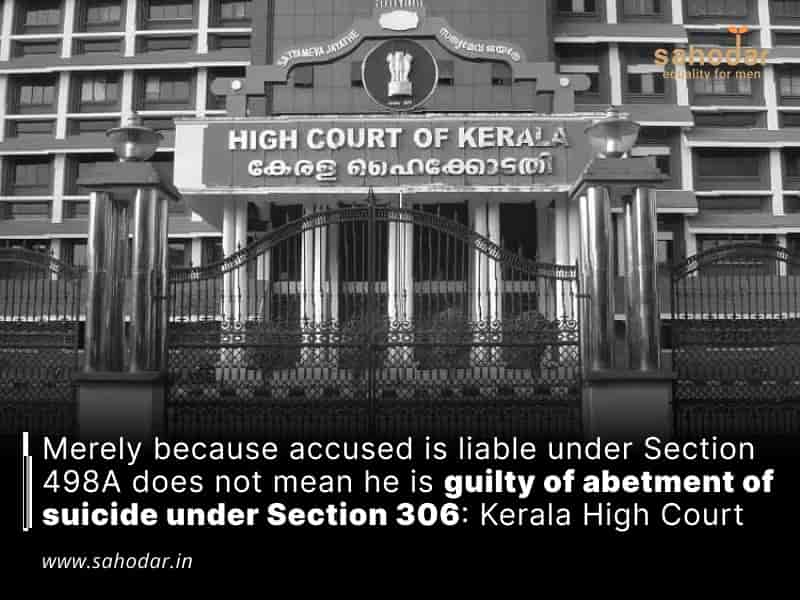The Court also held that just because certain provisions under special acts shift the burden of proof on the accused, that doesn’t make those provisions unconstitutional.
The Kerala High Court on Tuesday observed that merely because an accused has been held liable to be punished under Section 498A of the Indian Penal Code (IPC), does not automatically mean that he must also be held guilty of having abetted the commission of suicide by the woman concerned under Section 306 IPC [Ajayakumar & Anr. v State of Kerala].
Justice A Badharudeen noted from the judgment of the Supreme Court in Ramesh Kumar v State of Chhattisgarh, that Sections 498A and 306 of the IPC are independent and constitute different offences.
\”Though, depending on the facts and circumstances of an individual case, subjecting a woman to cruelty may amount to an offence under Section 498A and may also, if a course of conduct amounting to cruelty is established leaving no other option for the woman except to commit suicide, amount to abetment to commit suicide. However, merely because an accused has been held liable to be punished under Section 498A, I.P.C, it does not follow that on the same evidence he must also and necessarily be held guilty of having abetted the commission of suicide by the woman concerned\”, the Court said in its judgment.
The Court also noted that the offences of dowry death under Section 304b IPC and the offence of abetment of suicide under Section 306 IPC both involve placing a reverse burden to prove the guilt on the accused under Sections 113B and 113A of the Indian Evidence, Act.
However, it observed that just because certain provisions under special acts shift the burden of proof on the accused, that doesn’t make those provisions unconstitutional.
\”Only because the burden of proof under certain circumstances is placed on the accused, the same, by itself, would not render the impugned provisions unconstitutional,” the Court made it clear.
In this regard, it cited an example of a reverse burden being cast upon the accused under the Narcotic Drugs and Psychotropic Substances Act, 1985 in Noor Aga v. State of Punjab and Anr.
It was concluded in the said judgment that the provisions of the NDPS Act which impose a reverse burden of proof are not ultra-vires the Constitution and ultimately it was held that the constitutionality of a penal provision placing burden of proof on the accused must be tested on the anvil of the State\’s responsibility to protect innocent citizens.
The High Court was considering an appeal moved by a man and his mother, who were both implicated in the suicide of a woman due to alleged harassment in relation to dowry.
The appellants were charged under section 304B (dowry death), 306 (abetment of suicide) read with 34 (acts done by several persons in furtherance of common intention) of the Indian Penal Code (IPC).
The Sessions Court convicted and sentenced them, prompting the instant appeal before the High Court.
Before addressing the question as to whether the findings entered into by the trial court are justifiable, the Court deemed it worthwhile to discuss the essentials required to constitute the offences under sections 304B and 306 IPC.
The Court highlighted that when an offense under Section 304B of IPC is alleged, the same has a proximate nexus with Section 113B (presumption as to dowry death) of the Indian Evidence Act, 1872.
However, it observed that \”once the prosecution succeeded in establishing that the death of the lady was the outcome of cruelty or harassment by her husband or any relative of her husband soon before her death within a period of 7 years of her marriage\”, only then is the burden cast on the accused \”to disprove and if he fails to rebut the presumption under Section 113B of the Evidence Act, the court is bound to act on it\”
In the instant, the court found that the prosecution successfully established the following fundamental constituents for attracting the provisions of Section 304B against the husband:
- death of a woman should have occurred otherwise than under normal circumstances;
- within 7 years of her marriage;
- soon before her death she should have been subjected to cruelty or harassment by the accused; and
- in connection with any demand for dowry to presume that the accused has committed dowry death.
However, it also found that the defense had not successfully disproved the husband\’s innocence under either 304B or 306 IPC.
On going through the facts of the case, the Court upheld the conviction and sentence imposed on the first appellant (victim\’s husband) by the trial court.
In the case of the mother, the court found that the prosecution had not succeeded in establishing that she had committed the offenses alleged and, therefore, acquitted her.
The appellants were represented by advocates Sastamangalam S Ajitkumar, Prabhu Vijaykumar and Renjith B Marar. The State was represented by Public Prosecutor Maya MN.
Source: https://www.barandbench.com/news/merely-because-accused-is-liable-to-be-punished-under-498a-does-not-mean-he-is-guilty-of-abetting-suicide-kerala-high-court

